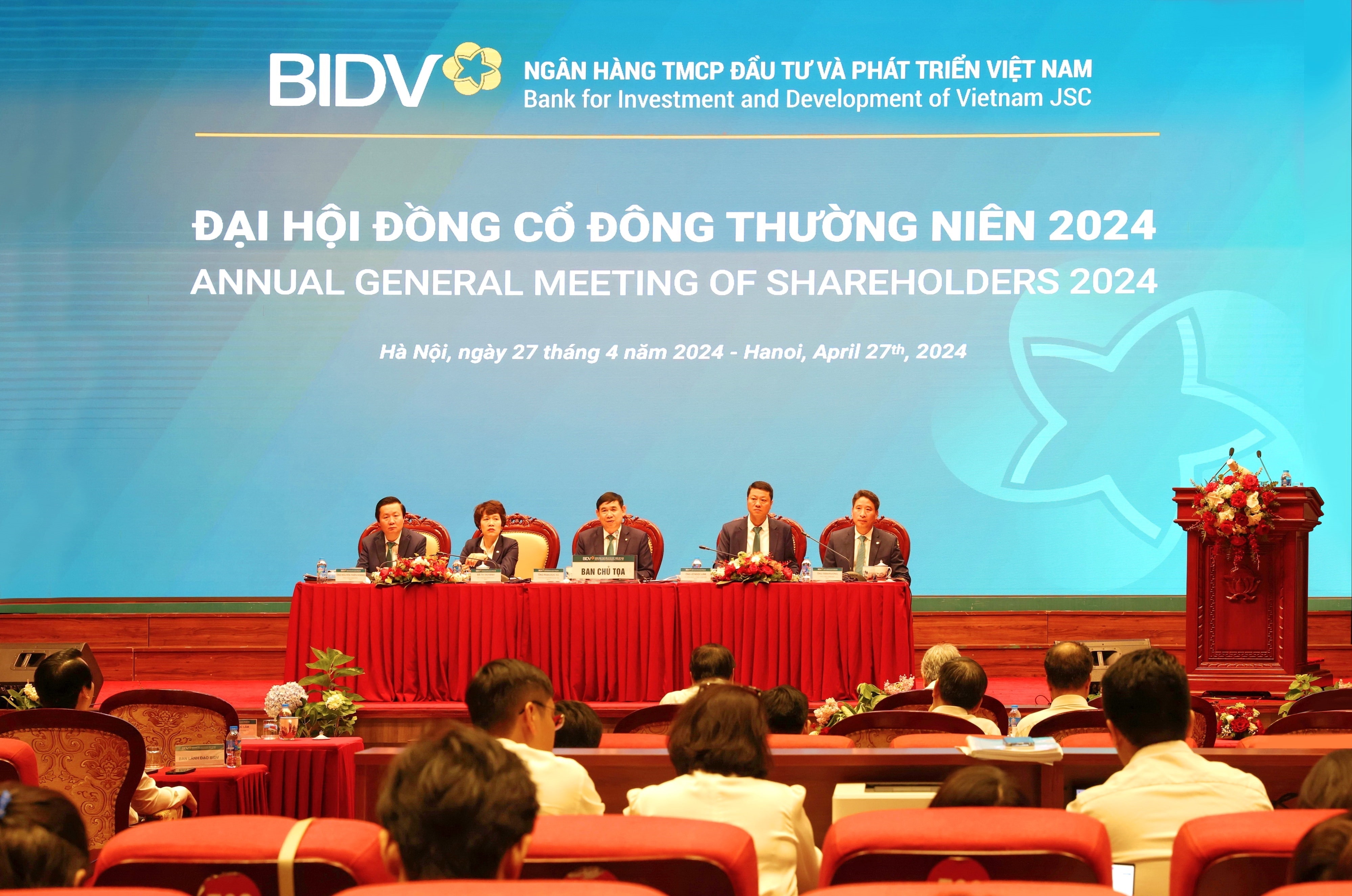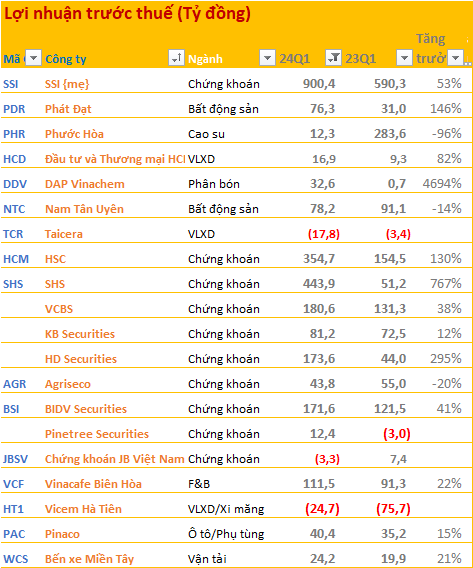Annual General Meeting Update

The 2024 BIDV Annual General Meeting (AGM) was held on the morning of April 27 in Hanoi. Photo: Organizing Committee
|
Pre-tax profit of over 7 trillion VND in Q1
According to the voting minutes, as of 8:00 AM on April 27, the 2024 BIDV AGM was attended by 142 shareholders, representing over 5.48 billion shares, equivalent to over 96.23% of the total voting shares. The AGM met the quorum requirement.
The Bank’s leaders gave a preliminary report on the operating results of Q1/2024: BIDV’s total assets reached over 2.28 million billion VND; outstanding credit balance exceeded 1.76 million billion VND, growing by 1%; mobilized capital reached over 1.9 million billion VND, growing by 1%; the non-performing loan (NPL) ratio under Circular 11 was controlled below 1.4% as guided; pre-tax profit reached over 7 trillion VND, up 6.7% year-on-year.
Plan to increase capital to over 70.6 trillion VND
Regarding the plan to increase charter capital in 2024, the BIDV Board of Directors proposed to issue a total of over 1.36 billion new shares to increase the charter capital from over 57,004 billion VND to over 70,624 billion VND through two options:
The first is to issue shares to pay dividends for 2022 with a quantity of nearly 1.2 billion shares to existing shareholders, corresponding to a ratio of 21% (holding 100 shares will receive 21 new shares). The implementation time is expected in the period of 2024-2025, and the Board of Directors will decide on the specific time after obtaining the approval of the competent authority.
The second is to offer for sale nearly 164.9 million shares privately, corresponding to a ratio of 2.89%, to professional securities investors, domestic and foreign investors with financial potential, or existing shareholders of the Bank. The number of investors offered is less than 100, while ensuring the maximum ownership ratio of foreign investors.
The offering price will be determined according to market principles, approved by state agencies. Privately offered shares will be subject to a three-year trading restriction for strategic investors and a one-year restriction for professional securities investors. The expected implementation time is within 2024-2025.
If both options are 100% completed, BIDV’s charter capital will increase by nearly 13,620 billion VND, which the Bank plans to use entirely to supplement its business capital, allocate it to BIDV’s business activities with a reasonable structure, and ensure that the use of capital is efficient, safe, and maximizes benefits for shareholders.
Continue to pay dividends in shares for 2023
With the profit distribution plan for 2023, BIDV’s profit after setting aside various funds is over 15,491 billion VND. The Bank plans to allocate 12,347 billion VND to pay dividends in shares (subject to the approval of the competent state agency). After paying dividends, BIDV’s remaining profit is over 3,144 billion VND.
In addition, the Board of Directors will submit to shareholders for approval the plan to temporarily set aside and use funds in 2024, including:
– Supplementary capital reserve fund: up to 5% of profit after tax.
– Financial reserve fund: up to 10% of profit after tax.
– Reward and welfare fund: up to three months of salary for employees and one and a half months of salary for managers.
Target credit growth of over 14%
In 2024, BIDV sets the target of outstanding credit growth in line with the limit set by the State Bank of Vietnam (SBV), expected at 14.04%, corresponding to nearly 2 million billion VND. Pre-tax profit will be subject to the approval of the competent state agency. The NPL ratio will be controlled below 1.4%.
| BIDV’s Pre-tax Profit from 2010-2023 |
BIDV’s Board of Directors will also submit to the AGM for approval the listing of non-convertible bonds and bonds with warrants issued to the public by BIDV.
Discussion
Update on the progress of the private offering?
Mr. Tran Phuong – Deputy General Director of BIDV: Previously, BIDV planned to issue a private offering with a ratio of 9% and is currently in the process of implementation. In 2024, the priority is to submit to shareholders for approval the issuance of nearly 165 million private shares, equivalent to a ratio of 2.89%. Some investors have expressed interest and made commitments. For the remaining portion, in 2024, the Bank will continue to actively work with potential investors and once the results are achieved, they will be reported to the state agency before seeking the shareholders’ opinion.
The issuance time will depend on market conditions. If the market assesses BIDV’s capacity and prospects positively, investors may proceed with the 2.89% portion immediately. If conditions are even more favorable from now until the end of the year, the remaining portion will be issued. We expect that the current market with rising credit growth and a recovery in the real estate sector will help BIDV’s business results pick up, creating favorable conditions for the private offering.
BIDV CEO warns customers about losing money in their accounts
Regarding the recent cases of customers losing money in banks, what will BIDV do if this happens at the bank?
Mr. Le Ngoc Lam – Member of the Board of Directors and General Director of BIDV: Recently, many customers, not only at BIDV but also at other credit institutions, have reported losing money in their accounts due to carelessness in accessing suspicious links or fraudulent calls. BIDV itself has implemented numerous warning measures on the app banking system, and we strongly advise customers to exercise extreme caution to avoid losing information or money from their accounts.
BIDV always prioritizes information security and protection. The Bank is doing everything it can, including investing in personnel, technology, and security tools to protect customers’ assets and information.
In the event that a loss of funds occurs due to actions by Bank staff, BIDV will investigate and handle the matter in accordance with the law. In the case of customers losing money, we will conduct investigations, cooperate with relevant authorities, and act in accordance with regulations.
How is ESG lending disbursed?
BIDV Board Chairman Phan Duc Tu: Since BIDV formulated its green development strategy, the Bank has consistently pursued it and has signed a cooperation agreement with the Ministry of Natural Resources and Environment to carry out internal efforts to reduce carbon emissions. At the same time, we have received a great deal of support from financial institutions around the world, and in fact, we have received international capital.
To date, the outstanding balance of green credit (renewable energy) is around 70,000 billion VND, accounting for 4% of BIDV’s total outstanding balance. The Bank has also developed an internal green development strategy, corporate governance, clean energy usage, and implementation of a circular economy in accordance with the government’s direction, and is developing a sustainable development strategy with the goal of zero carbon emissions.
In terms of environmental activities, BIDV regularly participates in planting millions of trees, building flood shelters, implementing clean water programs for green living, and supporting businesses and people in areas affected by climate change.
What customer segments will the Bank need to focus on in the future?
Chairman Phan Duc Tu: In Vietnam, major banks compete in all customer segments, and none of them focus solely on individual customers. With the largest total assets in the system, BIDV also does not focus on any particular segment. If ten years ago, BIDV was more focused on wholesale, recently, the Bank has restructured its customers. Currently, the proportion of outstanding balances is 33% for large customers, 23% for small and medium-sized customers, and 43% for individual customers. This structure is in line with commercial banks and the structure of the economy.
However, for each segment, BIDV also has its own competitive strategy, specific areas, groups, and customer segments. The bank has developed a strategy to develop large customer groups and has policies in place to ensure that relationships are developed, such as co-financing and cash flow management.
SMEs also contribute significantly to the economy in terms of cash flow, labor, and we also have





































